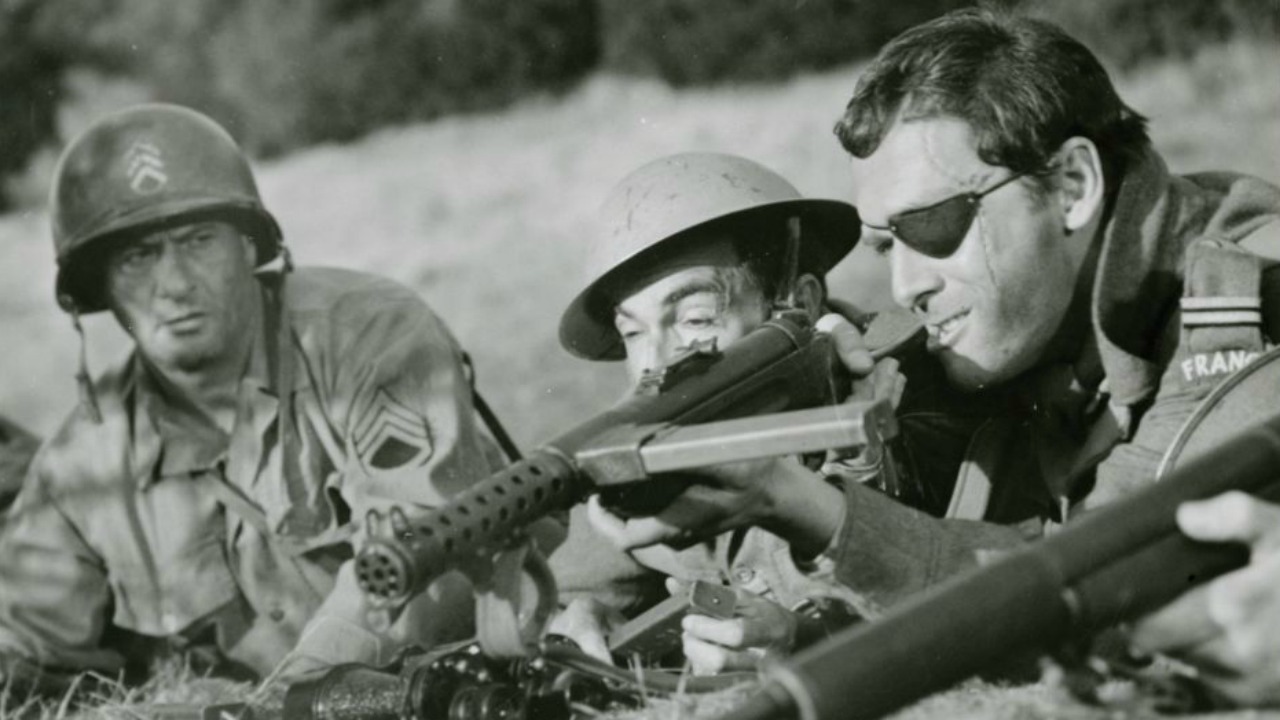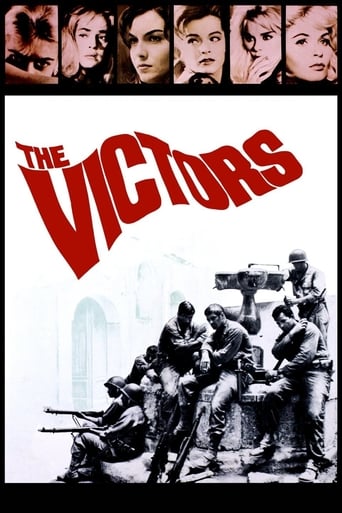arthur_tafero
The Victors is an underrated film directed by Carl Foreman and with an all-star cast. The notable performances of lives affected from D-Day to shortly after the war are highly believable, and well-acted. Included in the stellar roles are Eli Wallach, George Peppard, and Vince Edwards. On the distaff side, a very effective Melina Mercouri (the best performance in the film) outdistances all the other female supporting roles. Mercouri plays a Polish refugee who has mastered the black market, the Germans, the Americans, and anyone else who comes into her territory.
VInce Edwards gives his role a decent effort, and even Mr. Sunscreen, George Hamilton, almost delivers a believable character. The photography is first-rate and the pacing of the film is impeccable. I highly recommend this as one the best WW 2 films ever to come out of Hollywood.
JohnHowardReid
Made with the co-operation of the Swedish Army Ordnance Corps. Photographed in black-and-white Panavision. Producer: Carl Foreman. A Carl Foreman Production. Copyright 31 December 1963 by Highroad Productions/Open Road Films. Released through Columbia Pictures. New York opening simultaneously at the Criterion and the Sutton: 19 December 1963. U.S. release: 19 December 1963. U.K. release: 12 October 1964. Australian release: 17 July 1964. 15,750 feet. 175 minutes. Cut by the censor to 155 minutes in Australia. SYNOPSIS: Following training in England, a U.S. infantry squad is sent into combat in Italy. After taking possession of a small town, one of the G.I.s, Baker, finds a few hours of happiness with a young mother, Maria, who has not heard from her soldier husband for several months. A few days later the group moves on and arrives in France after the D- Day landings. During the occupation of a small town, a rugged non-com named Craig (who later has his face shot away) spends an evening with a Frenchwoman terrified by the constant bombings. Another, Chase, becomes involved with a wealthy woman, Magda, who wants him to desert and join her in the enormously profitable black market. But he rejects her and rejoins his outfit and is wounded in action. Once the group has moved into Belgium, Sergeant Trower falls in love with Regine, a nightclub violinist, but loses her when she turns into a promiscuous opportunist. Later, in Berlin, he takes up with a young blonde who lives in the Russian zone and whose sister boasts of the greater luxuries provided for her by her Russian captain. Following a disillusioning evening with her, Trower becomes involved in a pointless squabble with a drunken Russian soldier.NOTES: Only film directed by screenwriter (Champion, High Noon, Bridge on the River Kwai, The Guns of Navarone) and sometimes producer, Carl Foreman.COMMENT: A count-the-pretentious themes picture. On the credit side, we can count Saul Bass's titles, Senta Berger's performance, Challis' stark, newsreel-looking photography, and especially the execution of Private Slovik sequence with Frank Sinatra singing "Have Yourself a Merry Christmas". Action fans and Albert Finney fans are likely to be very disappointed by the minute amount of time given to them. It's very obvious that far, far too much footage was shot, but even so, many people just disappear from this film without any explanation.Needless to say, the movie does accommodate at least one actor whom we all wish would disappear, but who doesn't do anything of the kind. I refer to George Hamilton who gives am absolutely dreadful performance.And also, sad to reveal, but Carl Foreman's direction is dull, using poorly-composed long takes to monotony, whilst his sentiments, though doubtless sincere, are expressed in rubbishy terms. One of the worst examples is the Anglo-American friendship episode underscored by "There'll Always Be an England"! No wonder Carl, a splendid writer, didn't direct any more films, although he does have further credits as a producer and an executive producer. (Also, of course, as a director, he obviously couldn't contain himself and thus shot far, far, far too much footage, most of which ended up on the cutting-room floor).
johnnie0168
This movie is an excellent example of a how a mediocre cast can produce an outstanding movie in the hands of the right director. To get performances like this from the likes of George Peppard, George Hamilton, Michael Callan and Vince Edwards is a great testament to the skills of Carl Foreman. Throw in outstanding screen writing (also Foreman) and one could argue that this movie is pretty much the work of one man. It is a starkly realistic war movie that neither glorifies nor condemns war, but only makes a statement of those involved in it. Basically a series of vignettes, separate but intertwining stories of a group of men in Europe. The loves and the hates, the frailties and strengths, the deceiving and the deceived - the gamut of emotions making up the human condition are all part of this underrated masterpiece. In this way it should - unlike your typical war movie - appeal to women every bit as much as men.

